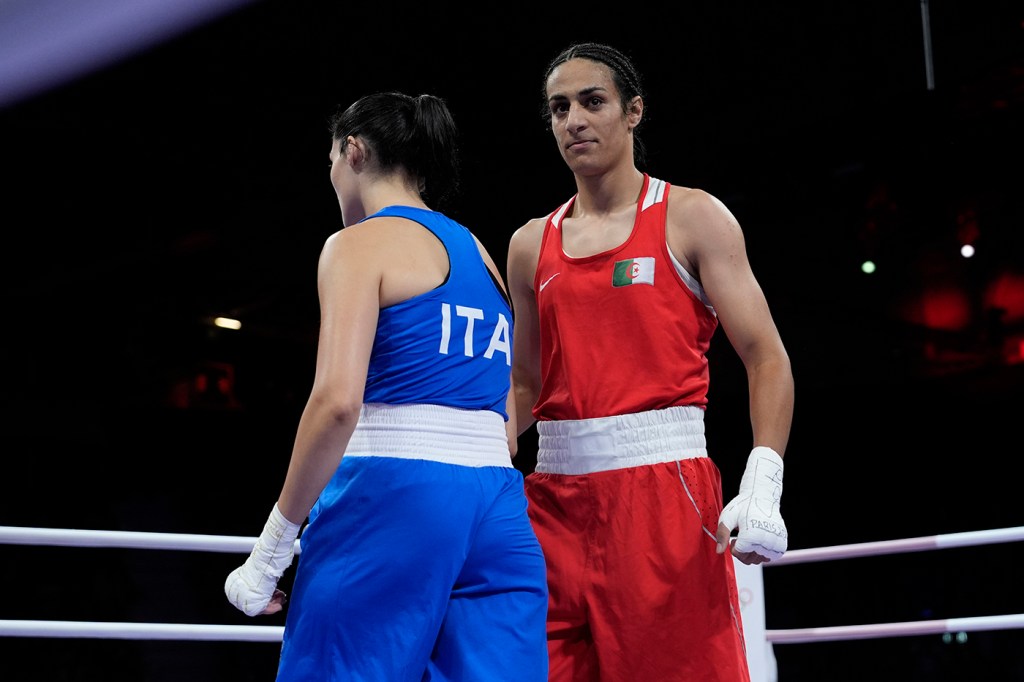Olympic boxing controversy sparks debate: Is gender eligibility testing in sports fair or flawed?
There are a number of issues with gender eligibility tests for female athletes, according to K.J. Rawson, an associate professor of English and women’s, gender and sexuality studies at Northeastern University.

The Paris Olympics became the source of global outcry after a 46-second fight between two boxers in the women’s 66 kg. weight class sparked debate over gender and fairness in sports.
Thursday’s bout between Imane Khelif of Algeria and Italy’s Angela Carini ended prematurely after Carini suffered a powerful blow to the head, then forfeited the match. After it was revealed that Khelif had been barred from competing at last year’s world championships by the International Boxing Association (IBA) as a result of failing a “gender eligibility test,” a deluge of misinformation, hate and protest soon followed on social media.
Northeastern University experts say gender eligibility tests are arbitrary, used to unfairly scrutinize women, and often don’t take into account the range of health conditions that can impact a person’s gender presentation.
“One of the biggest problems with gender eligibility tests for women athletes has been how unevenly and arbitrarily they are called for and administered,” says K.J. Rawson, a professor of English and women’s, gender and sexuality studies at Northeastern.
“Since sex is determined by a number of different factors — chromosomes, hormones, internal and external genitalia, secondary sex characteristics, etc. — and most people are never tested for these factors, governing bodies need to determine which tests they will require and which factors they value most for their eligibility criteria,” Rawson says.
The IBA’s president, Umar Kremlev, claims that Khelif was disqualified from competition last year because “it was proven they have XY chromosomes,” though evidence has yet to surface to corroborate that claim.
Khelif was assigned female at birth, as stated on her passport, according to the Associated Press. That is the International Olympic Committee’s (IOC) threshold for eligibility for boxing.
Khelif is scheduled to fight Anna Luca Hamori of Hungary in a quarterfinal bout on Saturday. Hungary’s Olympic committee is asking the International Olympic Committee to disqualify Khelif ahead of that match.
Medical conditions can cause high testosterone
There are a range of medical conditions that cause higher-than-average testosterone in women, including the relatively common condition of PCOS, polycystic ovarian syndrome, Rawson says.
“What is perhaps more important about this question, though, is that it shows how measurements of ‘appropriate’ biological sex are based on ranges, which we know do not capture all people,” Rawson says.
For example, he says that a female competitor could be categorized as having “high” testosterone when her levels are above 70 nanograms per deciliter of testosterone (ng/DL), but that might be only a single point above the normal range.
“For men, the lowest normal level is 300 ng/DL (and the ceiling is 1,000 ng/DL), which shows not only how large these ranges are — and how statistically insignificant a few points can be — but also that there is a major gap between ‘normal’ testosterone levels for men and women where some people’s bodies naturally produce amounts of testosterone that have been deemed ‘abnormal,’” Rawson says.
Is Khelif ‘intersex’?
There’s been speculation circulating as to whether Khelif is “intersex,” which describes people who do not fit into the neat sexual categories of male and female, usually due to some specific medical condition, says Jessica Glazier, a postdoctoral research associate at Northeastern.
“There are a lot of people who are intersex who may have differences in sexual development that simply just don’t conform to this binary idea of biological sex,” says Glazier, who studies the ways people categorize “both themselves and others and the consequences of these categorizations.”
“Many people don’t realize this exists, and some people who are intersex may not even know they are until later in life, such as when they go through puberty, have surgery, or until they want to have children and struggle with fertility,” she says.
Athletes with an intersex condition can find themselves in a losing battle with the regulations that govern participation in sport, such as track and field star Caster Semenya. Semenya, a two-time Olympic champion, is hyperandrogenous, meaning she has elevated levels of testosterone, according to CNN.
What is perhaps more important about this question, though, is that it shows how measurements of ‘appropriate’ biological sex are based on ranges, which we know do not capture all people.
K.J. Rawson, a professor of English and women’s, gender and sexuality studies at Northeastern
Semenya has spoken about the negative effects of the testosterone-reducing medication she has had to take to compete internationally.
“Given the natural occurrence of intersex people, sports that are strictly split into men’s and women’s competitions are strained to accommodate all competitors,” Rawson says.
He continued: “What we’re seeing in the current Olympics is a continuation and extension of the hyper-scrutiny that is placed on certain female athletes whose sex is being challenged largely because some people think they look too masculine. Notably, this is a separate conversation from how transgender athletes compete, though these issues are certainly related.”
The IOC, which has long feuded with the IBA, stood behind the decision to let Khelif compete.
“All athletes participating in the boxing tournament of the Olympic Games Paris 2024 comply with the competition’s eligibility and entry regulations, as well as all applicable medical regulations set by the Paris 2024 Boxing Unit,” the IOC said in a statement.
“In our current global moment where gender has become a contentious issue, it is often women athletes who do not look sufficiently feminine who are targeted for additional scrutiny,” Rawson says.






